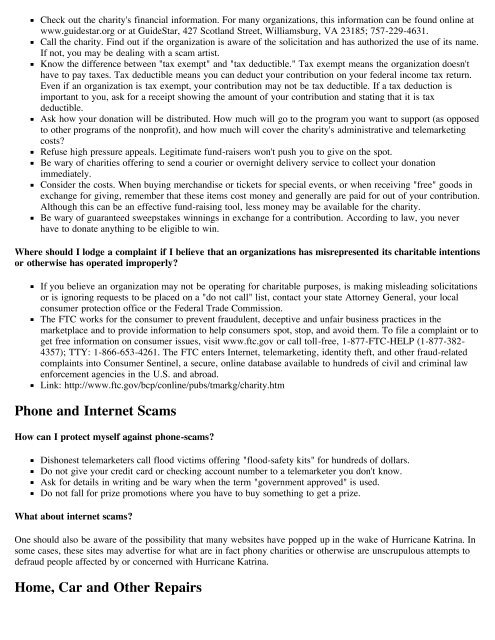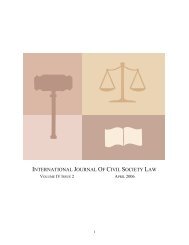Hurricane Katrina: Legal Issues - Columbus School of Law
Hurricane Katrina: Legal Issues - Columbus School of Law
Hurricane Katrina: Legal Issues - Columbus School of Law
Create successful ePaper yourself
Turn your PDF publications into a flip-book with our unique Google optimized e-Paper software.
Check out the charity's financial information. For many organizations, this information can be found online at<br />
www.guidestar.org or at GuideStar, 427 Scotland Street, Williamsburg, VA 23185; 757-229-4631.<br />
Call the charity. Find out if the organization is aware <strong>of</strong> the solicitation and has authorized the use <strong>of</strong> its name.<br />
If not, you may be dealing with a scam artist.<br />
Know the difference between "tax exempt" and "tax deductible." Tax exempt means the organization doesn't<br />
have to pay taxes. Tax deductible means you can deduct your contribution on your federal income tax return.<br />
Even if an organization is tax exempt, your contribution may not be tax deductible. If a tax deduction is<br />
important to you, ask for a receipt showing the amount <strong>of</strong> your contribution and stating that it is tax<br />
deductible.<br />
Ask how your donation will be distributed. How much will go to the program you want to support (as opposed<br />
to other programs <strong>of</strong> the nonpr<strong>of</strong>it), and how much will cover the charity's administrative and telemarketing<br />
costs?<br />
Refuse high pressure appeals. Legitimate fund-raisers won't push you to give on the spot.<br />
Be wary <strong>of</strong> charities <strong>of</strong>fering to send a courier or overnight delivery service to collect your donation<br />
immediately.<br />
Consider the costs. When buying merchandise or tickets for special events, or when receiving "free" goods in<br />
exchange for giving, remember that these items cost money and generally are paid for out <strong>of</strong> your contribution.<br />
Although this can be an effective fund-raising tool, less money may be available for the charity.<br />
Be wary <strong>of</strong> guaranteed sweepstakes winnings in exchange for a contribution. According to law, you never<br />
have to donate anything to be eligible to win.<br />
Where should I lodge a complaint if I believe that an organizations has misrepresented its charitable intentions<br />
or otherwise has operated improperly?<br />
If you believe an organization may not be operating for charitable purposes, is making misleading solicitations<br />
or is ignoring requests to be placed on a "do not call" list, contact your state Attorney General, your local<br />
consumer protection <strong>of</strong>fice or the Federal Trade Commission.<br />
The FTC works for the consumer to prevent fraudulent, deceptive and unfair business practices in the<br />
marketplace and to provide information to help consumers spot, stop, and avoid them. To file a complaint or to<br />
get free information on consumer issues, visit www.ftc.gov or call toll-free, 1-877-FTC-HELP (1-877-382-<br />
4357); TTY: 1-866-653-4261. The FTC enters Internet, telemarketing, identity theft, and other fraud-related<br />
complaints into Consumer Sentinel, a secure, online database available to hundreds <strong>of</strong> civil and criminal law<br />
enforcement agencies in the U.S. and abroad.<br />
Link: http://www.ftc.gov/bcp/conline/pubs/tmarkg/charity.htm<br />
Phone and Internet Scams<br />
How can I protect myself against phone-scams?<br />
Dishonest telemarketers call flood victims <strong>of</strong>fering "flood-safety kits" for hundreds <strong>of</strong> dollars.<br />
Do not give your credit card or checking account number to a telemarketer you don't know.<br />
Ask for details in writing and be wary when the term "government approved" is used.<br />
Do not fall for prize promotions where you have to buy something to get a prize.<br />
What about internet scams?<br />
One should also be aware <strong>of</strong> the possibility that many websites have popped up in the wake <strong>of</strong> <strong>Hurricane</strong> <strong>Katrina</strong>. In<br />
some cases, these sites may advertise for what are in fact phony charities or otherwise are unscrupulous attempts to<br />
defraud people affected by or concerned with <strong>Hurricane</strong> <strong>Katrina</strong>.<br />
Home, Car and Other Repairs

















